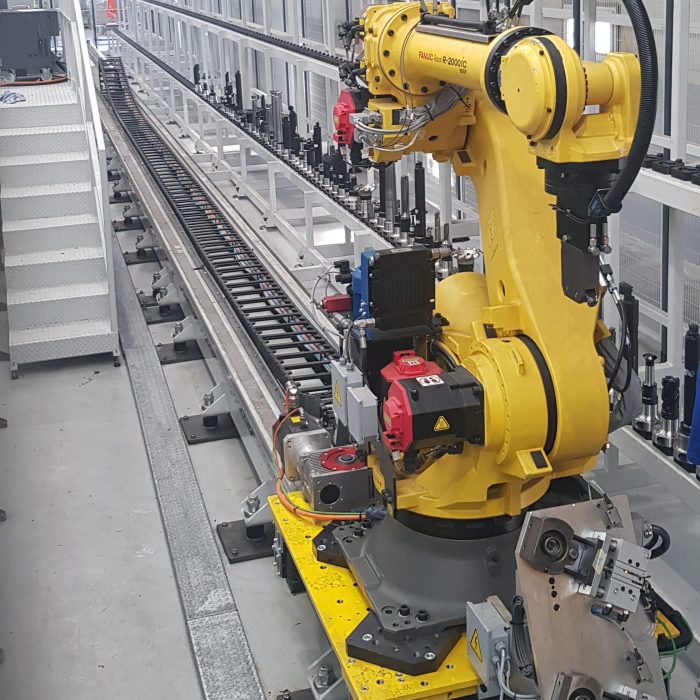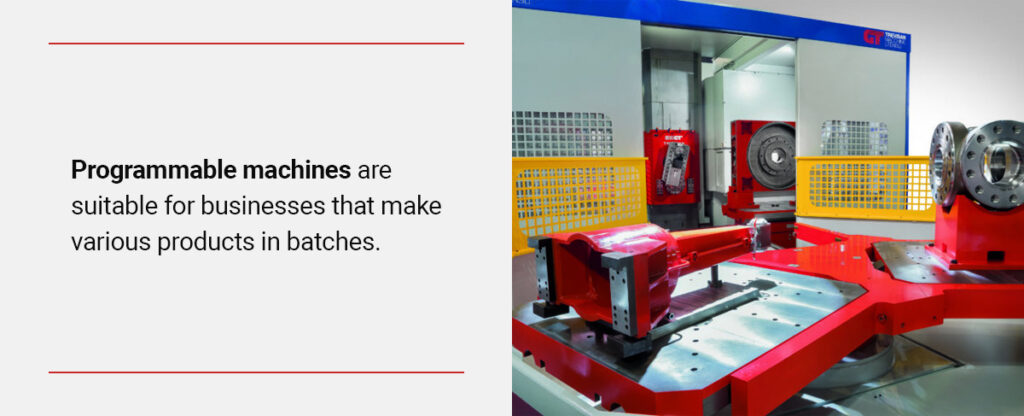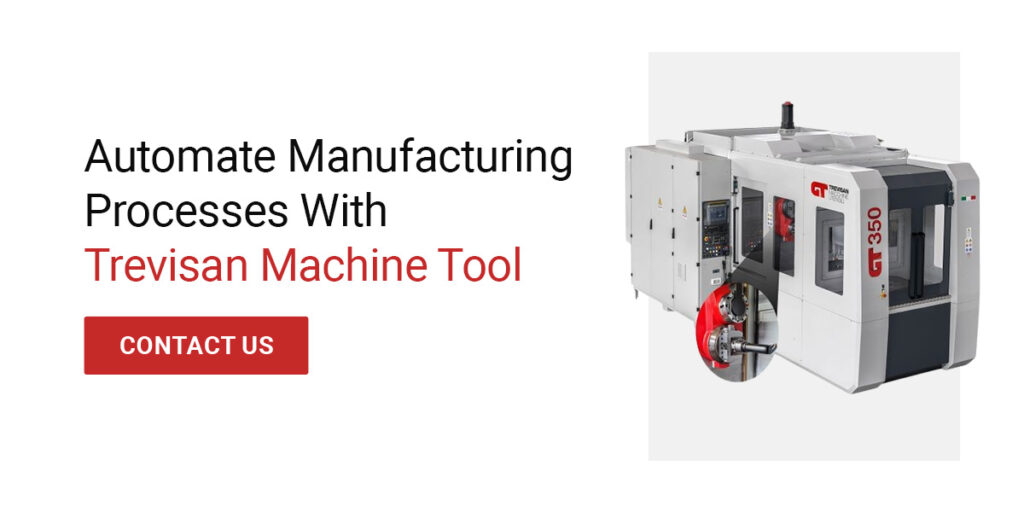
Manufacturing automation refers to the use of technology in manufacturing processes to reduce human intervention. Automated machinery — often controlled by computers and programming — can complete repetitive tasks quickly and accurately. It can also take over dangerous tasks to improve worker safety. This assistance streamlines manufacturing operations and allows workers to use their skills for more essential tasks.
With material and labor issues rampant throughout the industry, manufacturing automation is now more critical than ever. Automated machines primarily benefit businesses by helping to increase output and grow profits. In this article, you’ll learn more about the different types of automation and how they improve manufacturing. We’ll also explain how Trevisan Machine Tool helps businesses in various industries integrate automation into their setups with innovative machining centers.
Why Is Manufacturing Automation Important?
The manufacturing industry currently faces various challenges. Most notable are the rising material costs and labor shortages. While inflation rates are slowly reducing, businesses and consumers are still experiencing the effects of a global average of 8.73% in 2022. With higher inflation rates, raw materials and energy cost more. Greater expenses make it hard for businesses to profit without charging consumers more for the finished product. This is another issue, as higher inflation rates reduce consumer purchasing power.
Labor shortages also impact businesses. With fewer qualified workers, manufacturers find it hard to fill essential roles and complete core business operations. Unskilled labor can also lead to more errors and waste, which increases expenses. Automation offers businesses the chance to overcome these challenges by reducing costs and reliance on manual labor.
Types of Automation in Manufacturing
Various forms of automation are available today. Depending on your requirements, you may need a specific type or a combination. Learn more about each type below to understand which one is best for your needs.
1. Fixed
Fixed or hard automation refers to machinery that can only perform preprogrammed, set tasks or processes. It’s complicated and expensive to change their programming, as it’s often tied to physical configuration and components like wiring and gears. However, these machines can perform specific tasks at high speeds and produce consistent and accurate results each time.
Manufacturers that create high volumes of identical units and use repetitive tasks benefit the most from fixed automation. Once set up, these machines can complete the same task repeatedly with limited human input. Fixed automation machines work well in assembly lines and conveyor systems.
2. Programmable

Programmable automation is the next step up from fixed automation. Programmable machinery can perform multiple tasks in varying sequences, allowing manufacturers to use it for different products. Although there are more advanced options, this type of automation offers more adaptability than fixed automation.
Programmable machines are suitable for businesses that make various products in batches. Once the machines finish processing one product batch, operators can adjust the programming to accommodate another. This makes it more versatile and able to adapt to different product requirements and specifications. Robotics, programmable logic controllers (PLCs) and computer numerical control machines (CNC) are examples of automation in manufacturing that use programmable automation.
3. Flexible
Flexible automation systems are more adaptable and productive than programmable machinery, but also utilize programming to customize processes. Flexible setups can perform various tasks in multiple ways, allowing them to machine a wide range of product types. They usually have more advanced technology and computer systems that control a machine’s tools and movements. Machine operators can make adjustments to the programming to automatically switch production to another product, limiting downtime between changeovers. Some flexible manufacturing systems can machine multiple product types simultaneously, further increasing productivity.
Businesses that require frequent changeovers and manufacture products with substantial design differences use flexible automation. When the machine needs to change to another product type, it’s relatively simple and quick to accomplish. Sensors within the machine also allow it to adapt its processes during machining. This is where flexible automation shines, as it offers quicker changeovers and greater machining customization and control.
4. Integrated
The most complex and advanced type is integrated automation. In an integrated system, a single control unit and computer system operate multiple machines, tools and automation technology. Integrated systems can be complicated to set up but offer the most efficiency and control. Every piece of machinery connects and communicates with each other, working together smoothly. Machine operators can change the entire production process from one convenient location.
Integrated automation benefits businesses that value efficiency and convenience. It’s also essential for manufacturing processes with different steps that require careful coordination and timing to reduce errors.
The Benefits of Automated Manufacturing
Manufacturers worldwide implement automation because of its many benefits, including:
- Efficiency: The main benefit of automation is its resource savings. Automated machines take less time than human workers to create the same number of items. They also produce more precise results, meaning they use the most economical amount of materials and energy. These factors result in highly efficient manufacturing processes.
- Productivity: Because automated manufacturing is so efficient, it often cuts down on production time per piece. This allows the machines to increase manufacturing output and produce more products.
- Quality: Experts use equipment, technology and programming to ensure automated machinery is highly accurate. Consequently, these machines can produce more precise results than humans can. They also make fewer errors, further improving product quality.
- Consistency: Thanks to their efficiency and quality control, automated machinery can repeatedly produce the same results. This is essential for high production volumes and products with tight tolerances.
- Cost savings: Automation reduces errors, uses fewer resources and improves product quality. These factors contribute toward significant cost savings, resulting in larger profit margins.
- Workplace safety: Various manufacturing tasks — such as welding, forging, lifting and working with chemicals — are dangerous for human workers. However, machines can perform them efficiently. This improves workplace safety and reduces job-related injuries. Machines can also remove the chance of workers developing repetitive motion-induced strain.
- Scalability: Time and resource constraints often limit output potential. Thanks to the drastic changes in output and cost savings through automation, businesses can rapidly scale their operations.
Automate Manufacturing Processes With Trevisan Machine Tool
Manufacturing businesses in the aerospace, defense, automotive, energy and industrial industries partner with Trevisan Machine Tool to automate their machining processes. With over 60 years of experience in automation and machining centers, we can help you with even the most complex machining requirements. We treat every customer as a partnership by working with you to find the most advantageous solution.
Trevisan offers a comprehensive range of CNC machines, including horizontal, vertical and multi-station machining centers. We’re pioneers in contour head development and equip our horizontal machining centers with innovative integrated U-axis facing heads. Our facing heads feature a dual spindle design that allows manufacturers to complete multiple machining processes in one setup. Coupled with stationary part machining, they can machine a wider range of components than traditional machines. If you require something more specialized, we can work with you to design a custom CNC machine that meets your unique needs.
Contact our team today to learn more about automation and our machining centers. We look forward to helping you and your business grow.

